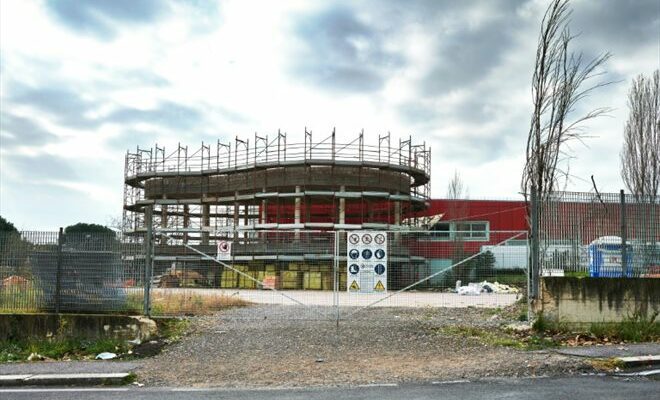A construction site on the outskirts of Rome on February 21, 2023 (AFP/Andreas SOLARO)
The Italian government is seeking to suspend a very popular tax incentive scheme aimed at making homes less energy-intensive, but whose costs “out of control” risk causing the budget deficit to explode.
This program called “superbonus”, intended for work ranging from thermal insulation to solar panels and the replacement of boilers and windows, was launched in May 2020 to stimulate the economy after the recession caused by the Covid-19 pandemic. 19.
Despite the skepticism of environmentalists as to its effectiveness, the Italians hastened to take advantage of this mechanism through which the State bears 110% of the cost of the interventions through tax credits or a tax reduction.
As expected, the program has stimulated the construction sector, but at a staggering cost of 61.2 billion euros for the state coffers, according to the Ministry of Finance.
Prime Minister Giorgia Meloni judged the situation “out of control” last weekend, denouncing fraud of around 9 billion euros.
In addition, the negotiable nature of tax credits has, according to her, “generated a kind of parallel currency (…) which risks having a devastating impact on the budget”.

A construction site on the outskirts of Rome on February 21, 2023 (AFP/Andreas SOLARO)
The device allows owners to deduct the cost of the work from their taxes over several years, or to sell this tax credit to their builder, who resells it to a bank, which then recovers the money from the State. .
For Lorenzo Codogno, former chief economist of the Treasury interviewed by AFP, this measure could have an impact on the Italian deficit, which could be revised upwards substantially, while the construction sector and the government “could have liquidity problems.
– Construction boom –
Italy’s deficit was expected to rise to 5.6% of GDP in 2022 and fall to 4.5% in 2023, according to government forecasts, but revised figures likely incorporating the cost of the superbonus are due on Wednesday.

A construction site on the outskirts of Rome on February 21, 2023 (AFP/Andreas SOLARO)
The superbonus was introduced by the coalition government of former Prime Minister Giuseppe Conte, of the Five Star Movement, a populist formation with environmentalist fiber.
This measure was “fundamental after Covid-19, both for the recovery of the Italian economy and for the restart of the construction sector”, argued Angelica Donati, president of the National Association of Construction Companies (ANCE ), in an interview with AFP.
The construction sector grew by 21.6% in 2021, largely helping to fuel Italy’s post-pandemic economic recovery.
But the scheme has resulted in far more work than originally expected and banks stopped buying the tax credits last year, leaving many construction companies struggling.
Ms Meloni’s government had already sought to limit subsidies, reducing the superbonus from 110% to 90%.
– Lost opportunity –
But last week he suddenly ended the use of tax credits, while trying to find a way to unlock the existing credits, an estimated 19 billion euros of work done, but not yet paid.

A construction site on the outskirts of Rome on February 21, 2023 (AFP/Andreas SOLARO)
According to ANCE, some 25,000 construction companies risk bankruptcy.
The government is also studying alternatives to the “superbonus”.
Environmentalists also hope for a change in the current system, which they consider a missed opportunity to initiate a change towards more ecological and less energy-consuming housing.
According to a study by the Bank of Italy, the “superbonus” is “not a profitable way” to fight against climate change.
For Matteo Leonardi, co-founder of the Italian climate change think tank ECCO, this project also lacked “ambition”.
“It was not linked to climate objectives, which would have justified the costs”, he explained to AFP, adding that the only condition of the work was to raise the dwellings of two energy classes. .
The superbonus is also criticized for not having sufficiently promoted innovative technologies such as heat pumps.
© 2023 AFP
Did you like this article ? Share it with your friends with the buttons below.




